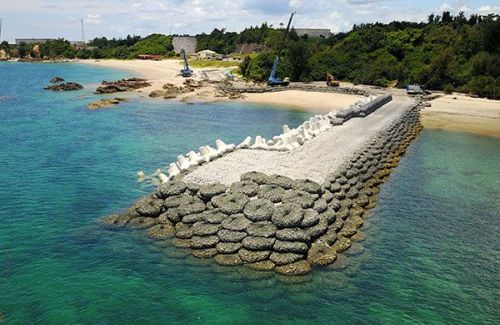Okinawa files new lawsuit to stop “outrageous” Henoko base relocation, claims “government construction illegal”

Wave-dissipating blocks are submerged as construction continues at the K9 levee. July 24, U.S. Military Camp Schwab, Henoko, Nago (photograph taken by drone)
July 25, 2017 Ryukyu Shimpo
The Okinawan government filed a lawsuit in the Naha District Court against the Japanese federal government July 24, to prevent the destruction of rock on the seabed off the coast of Henoko in Nago as part of the new U.S. base construction. The prefectural government claims that continuing the construction without obtaining permission to damage the rock is illegal. Okinawa has also filed an injunction that halts construction until a decision is reached in the lawsuit. This will be the fifth legal battle between the Okinawan and central governments.
Governor Takeshi Onaga held a press conference at the prefectural office at 5:00 p.m. on July 24, criticizing the government’s position, saying, “the central government has arbitrarily changed its stance on fishing rights for the sake of the Henoko issue. We have drifted away from a being a nation of laws.” He added, “[This trial] is not to question if base construction is right or wrong, but rather questions the state for its stance to push through the new construction while disregarding the feelings of Okinawans.” Onaga stressed the importance of the lawsuit was to highlight the central government’s forceful position.
While answering questions from reporters, Onaga said, “We will inform both Okinawans and people all over Japan about the fishing rights problem, while challenging the outrageousness of the new base construction and the government’s hasty and rash behavior.”
In the lawsuit, the Okinawan government is arguing that fishing rights exists on the water designated for construction, and that the central government is required to obtain permission from the Okinawan government to damage rock on the seabed before beginning construction. Meanwhile, the government is arguing that the Nago fishing co-op has already relinquished their fishing rights, and that it is not necessary to obtain permission from the Okinawan government to damage the seabed rock.
In the Okinawan government’s claim, they argue that in articles 11 and 22 of the Fisheries Act, the “partial relinquishing” of the fishing rights granted to the Nago Co-op signify a “contraction” of the fishery, and that, “a fishery contraction corresponds to a ‘change,’ which has been the case since the Meiji Fishery Act, and naturally continues to govern the fishing industry to this day.” According to the prefectural government, any change in fishing rights requires the permission of the governor.
Furthermore, as the reason the Okinawan government is able to demand the central government apply for permission to destroy rock in the seabed was, Okinawa’s government is “the principal agent for protecting public interests such as preserving fishing resources,” and stressed that they have the executive right to make this type of permission request, “obligatory.”
(English translation by T&CT and Sam Grieb)
Previous Article:Digital Edition Extra: Prefectural government files lawsuit concerning necessity of damaging rock permission renewal
Next Article:Naha Airport runway closed due to damaged JASDF F-15 fighter jet, civilian flights delayed and canceled
[Similar Articles]
- Digital Edition Extra: Prefectural government files lawsuit concerning necessity of damaging rock permission renewal
- Governor Onaga announces lawsuit to demand national government obtain reef crushing permit for Henoko construction
- Naha District Court rules against Okinawa in lawsuit to prevent coral reef destruction, does not rule on fishing rights
- Okinawa Governor orders Defense Bureau to stop installing concrete blocks in the sea off Henoko
- National government files new lawsuit against Okinawa, bringing Henoko issue back to court
 Webcam(Kokusai Street)
Webcam(Kokusai Street)


